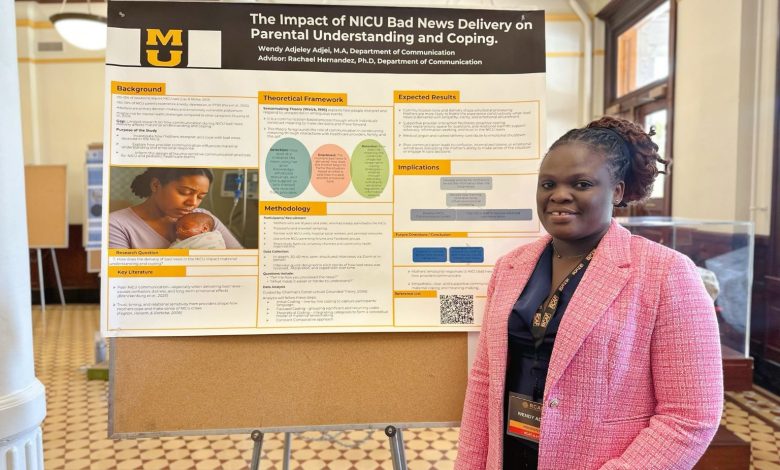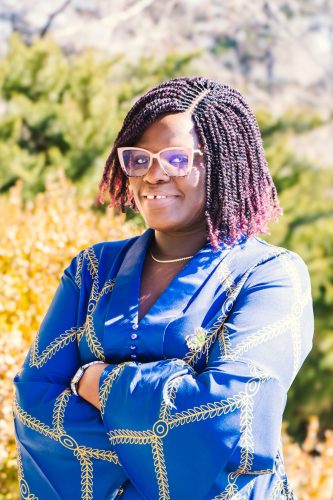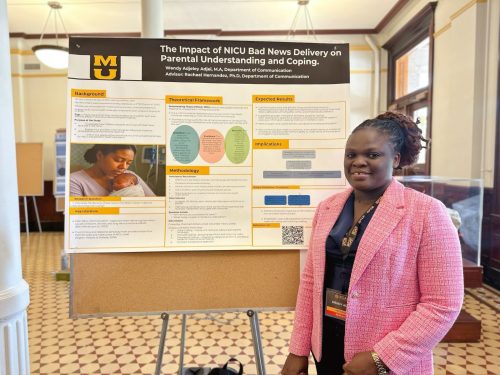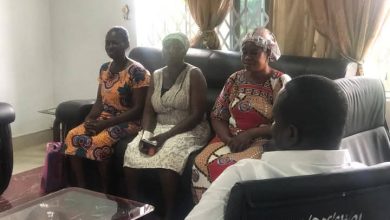Ghanaian Scholar Wendy Adjeley Adjei Champions a New Era in Maternal Healthcare Communication in the U.S.


Wendy Adjeley Adjei, a Ghanaian scholar and health communication expert, is reshaping the way maternal healthcare is understood and practiced in the United States. Her journey from the classrooms of La St. Paul’s Anglican JSS and Ningo Secondary School in Ghana to the forefront of U.S. health research is not only inspirational—it’s transformative.
Wendy’s academic path began at the University of Cape Coast, where her passion for effective communication and social impact earned her a place among Ghana’s promising young thinkers. Her exceptional academic performance and commitment to public health communication led to a fully funded master’s degree in communication at Purdue University, one of America’s prestigious institutions. She furthered her studies at the University of Missouri, where she is currently pursuing a Ph.D. in Health Communication with full funding at one of the top-ranked public research universities (R1) in the U.S.
Her work focuses on patient-provider communication, maternal and child health, and birth equity—critical areas in addressing the growing challenges in maternal healthcare outcomes across racial and socioeconomic lines in the U.S. and around the world.
At the University of Missouri, Wendy’s contributions extend beyond academia. She is actively involved in community initiatives, serving on the Kansas Birth Equity Network, volunteering as a blood donor ambassador with the American Red Cross, and recently being elected as Director of Legislative Affairs for the university’s Graduate Professional Council. In this role, she advocates for policies that center student well-being and equity at both institutional and state levels.

Wendy’s current research project, titled “The Emotional Legacy of Memorable Messages: Exploring the Impact of Communication on Maternal Birthing Experiences in the U.S.”, delves into how mothers recall and interpret the verbal and non-verbal communication they received during childbirth. Through extensive interviews with mothers from diverse racial, cultural, and economic backgrounds, Wendy uncovers a profound truth: communication during childbirth has lasting emotional consequences.
Her findings reveal that mothers remember specific affirming phrases like “You were made for this,” which provided reassurance and strength. Yet, equally powerful were the moments of silence, misattuned responses, or outright dismissals—moments that left lasting feelings of abandonment, trauma, or mistrust. These memories, Wendy argues, significantly shape not only maternal mental health but also long-term trust in healthcare systems.
In response, she developed the Emotionally Attuned Communication Protocol (EACP)—a trauma-informed framework designed to train healthcare providers in relational and equity-centered care. The EACP emphasizes empathy, active listening, and culturally sensitive communication, highlighting that every word, pause, and gesture during childbirth can affect not only the birth outcome but also a mother’s emotional and psychological well-being.
“Communication is not just bedside manner,” Wendy emphasizes. “It is a form of care. It is either a bridge or a barrier to trust, healing, and dignity.”
At a time when the United States is facing alarming rates of maternal mortality and mental health crises, particularly among Black and minority women, Wendy Adjeley Adjei’s work is a timely and necessary call for systemic change. Her research urges policymakers, medical educators, and healthcare institutions to rethink how communication training is integrated into maternal care practices.
Wendy is not only making an academic contribution—she is redefining how care is delivered, experienced, and remembered. Her work connects continents, cultures, and care philosophies, bringing global attention to the emotional dimensions of childbirth and the need for compassionate communication at every step.
Through advocacy, research, and community engagement, Wendy Adjeley Adjei exemplifies what it means to lead with purpose. She is a beacon of hope for mothers, a catalyst for healthcare reform, and a proud testament to the power of Ghanaian excellence on the global stage.





